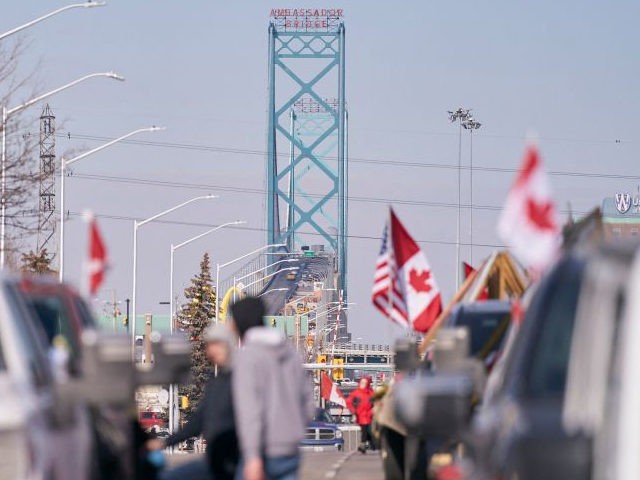The Ambassador Bridge between Detroit and Ontario, which closed overnight on Monday and reopened to slow-moving traffic on Tuesday, was once again blocked by protesting Canadian truck drivers on Wednesday.
The bridge is part of the busiest and most commercially valuable border crossing between Canada and the United States, so it has become a pivotal scene in the Freedom Convoy saga.
The Detroit News quoted growing concern on both sides of the border about the economic impact of the Ambassador Bridge blockade:
“Any delay or disruption in the supply chain creates problems, not just for agriculture but the state economy,” said Chuck Lippstreu, president of the Michigan Agri-Business Association, which represents businesses that support farmers, early in the closure.
The Canadian Vehicle Manufacturers’ Association, which represents the Detroit Three automakers, called for an end to the protest, citing its effect on the country’s economy.
“Auto production relies on efficient supply chain logistics for delivery of parts, components and vehicles,” the association said in a statement Tuesday. “Persistent delays at the Ambassador Bridge risk disrupting automotive production that employs tens of thousands of Canadians.”
Overflow traffic is beginning to clog alternate routes like the Blue Water Bridge, where personal and commercial traffic is now backed up for miles, with wait times to cross the bridge exceeding four and a half hours on Wednesday morning:
“I’ve already heard from automakers and food grocers. This is really a serious cause for concern,” Canadian Transport Minister Omar Alghabra told the BBC on Tuesday.
“The disruption of the Ambassador Bridge is an attack on the well-being of our citizens and the businesses that employ them. As our economies emerge from the impacts of the pandemic, we cannot allow any group to undermine the cross-border trade that supports families on both sides of the border,” a coalition of U.S. and Canadian businesses said in a statement released on Tuesday night.
Windsor Mayor Drew Dilkens and Police Chief Pam Mizuno held a press conference on Wednesday in which they said about a hundred protesters are blocking the bridge with 50 to 75 vehicles.
“You have a number of people who are on the ground here in the protest group that have outwardly stated that this cause is so passionate for them, they feel such a passion for this particular cause, that they’re willing to die for it. I think one can appreciate that if you have people that hold that sentiment, the situation can escalate to become very dangerous for police and those members of the public in very short order,” Dilkens said.
Windsor police officials described the demonstrators as mostly “cordial” but determined. Dilkens and Mizuno said additional officers, police vehicles, and intelligence support for the Ambassador Bridge had been requested from the provincial and national governments.
“Action will have to be taken to open this bridge,” a frustrated Dilkens said.
“I’ll be brutally honest: You are trying to have a rational conversation and not everyone on the ground is a rational actor,” he said. “Police are doing what is right by taking a moderate approach, trying to sensibly work through this situation where everyone can walk away, nobody gets hurt, and the bridge can open.”
Windsor police would not discuss their plan to reopen the bridge with reporters, insisting their department “respects the rights of Canadians to exercise their freedom of expression and peacefully assemble” and pledging to maintain “open communications” with protest organizers.

COMMENTS
Please let us know if you're having issues with commenting.